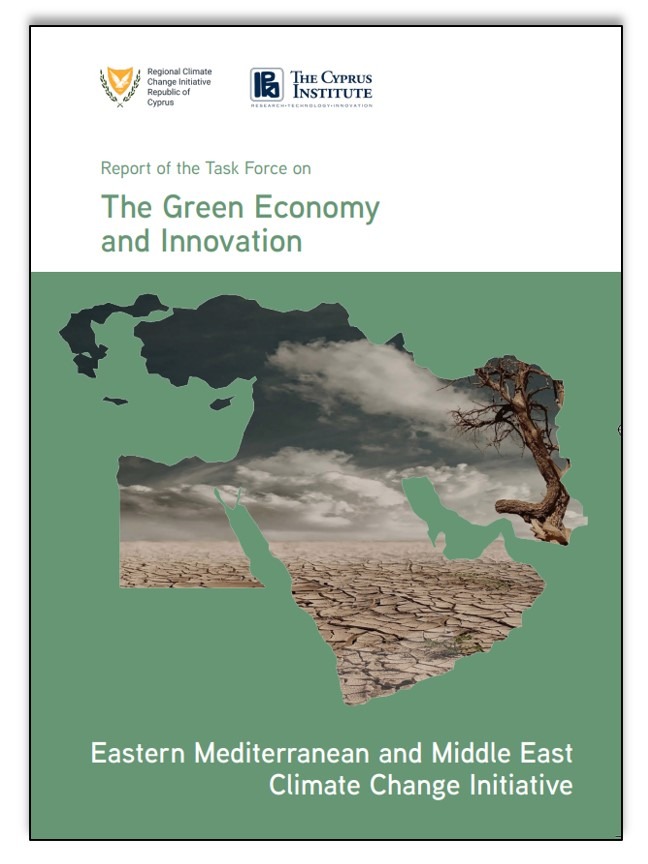
Green Economy and Innovation
The report of the Green Economy and Innovation TF provides a review of the impact of climate change in the economies of the region, based on the scientific findings of the other thematic Task Forces of the Initiative. It draws attention to the limitations of the current economic linear models, which are still dominant in the EMME, and provides examples of possible sustainable development pathways.
The report describes the current state of green economy and innovation policies and actions in the EMME countries, as well as cross border frameworks and collaborations. Furthermore, the report suggests policies and actions by drawing from examples of innovation policies and practices which have proven successful in promoting a greener economy in other regions. It identifies relevant transitional practices and suggests a roadmap on how they can be adapted to the EMME region.
The report provides specific policy recommendations for establishing a joint regional pathway towards the green economy paradigm, taking into consideration the Paris Agreement and the EU’s Green Deal.
Finally, it proposes specific pilot joint initiatives on the major challenges/opportunities to be financed by the EMME countries, eventually in cooperation and support from international organisations.
(Click here to download the report in .pdf format)
Abstract on the Report of the Task Force on Green Economy and Innovation
The exponential growth of global production and consumption patterns has brought the planet near-catastrophic climate changes and the collapse of biodiversity. The impact of such a crisis is particularly relevant in the Eastern Mediterranean and Middle East
(EMME). It could be mitigated by the adoption of virtuous economic models that take into account environmental externalities and the need to preserve natural capital through
circular and regenerative practices. Such models should be designed to maximise social benefits, increase local prosperity and promote an inclusive job market. Specific policies are required in a multi-level and systemic perspective, to leverage and orient innovation capacity towards the green transition.
This report explores the situation in the EMME region and highlights practices and constraints that characterise each of the 17 economies in the area. Taking into account global trends and the regional context, it proposes four transitional missions, targeting the urban transition, the water-energy-food nexus, industrial symbiosis and the economy of natural ecosystems. The report makes four recommendations for implementing mechanisms that
could support the development of the green economy in the region:
1) creating consistent data, economic models and policy assessment at the regional level,
2) promoting green skills,
3) establishing a distributed platform to accelerate green innovations, and
4) creating a regional green research and innovation partnership to expand the place-based generation of knowledge.

Task Force
Task Force Coordination
Fabio Maria Montagnino, The Cyprus Institute
Cyprus Institute Liaison Scientist
Vassilios Tsakalos
Task Force Members
Hussein Abaza, Advisor, Minister of Environment, Egypt
Fahmi Abu Al-Rub, Director, Applied Scientific Research Fund (ASRF), Jordan
Thomas Andersson, President, IKED, Sweden
Adi Barel, Director, European Institute of Innovation and Technology (EIT) Hub, Israel
Nicola Bettio, Professor, HCT, United Arab Emirates
Ramy Boujawdeh, Deputy General Manager, Berytech Incubator, Lebanon
Federico Maria Butera, Professor Emeritus, Politecnico di Milano, Italy, International Expert
Alexandros Charalambidis, Professor, Cyprus University of Technology, Cyprus
Anthi Charalambous, Director of Energy & Environment Division, Cyprus Employers & Industrialists Federation (OEB), Cyprus
Shada El-Sharif, Senior Advisor, SustainMENA, Jordan
Scott Fargher, Associate Professor, Mohammed Bin Rashid School of Government, United Arab Emirates
Piero Formica, Professor, Innovation Value Institute, Maynooth University, Ireland,
International Expert
Cleofe Guardigli, Senior Consultant, Ministry of Labour, Turkey
Yousef Haik, Professor, Hamad Bin Khalifa University, Qatar
Khaled Shana’a, Professor, Palestinian Ahlyia University, Palestine
Suhil Kiwan, Dean of Engineering Faculty, Jordan University of Science and Technology (JUST), Jordan
Konstantinos Klevoulou, Assistant Vice President for Strategy, The Cyprus Institute, Cyprus
Maria Markidou Georgiadou, Managing Director, Cyprus Seeds, Cyprus
Deepti Mahajan Mittal, Senior Policy Specialist, Ministry of Environment, United Arab Emirates
Vincenzo Nicolò, Professor, INTENTAC, Italy, international expert
Amr Radwan, Director of Research, Egyptian Centre for Innovation and Technology Development (ECITD), Egypt
Nicos Rossides, Advisor to the Board, The Cyprus Institute, Cyprus
Penelope Shihab, CEO, Monojo, Jordan
Andri Theodorou, Officer, Cyprus Chamber of Commerce and Industry (CCCI), Cyprus
Anastasios Vasiliadis, Director, Institute of Entrepreneurship Development (IED), Greece
Mohamed Ahmed Wageih, Project Management Officer, PRIMA Foundation, Egypt
Shiri Zemah Shamir, Researcher, School of Sustainability, Reichman University, Israel

